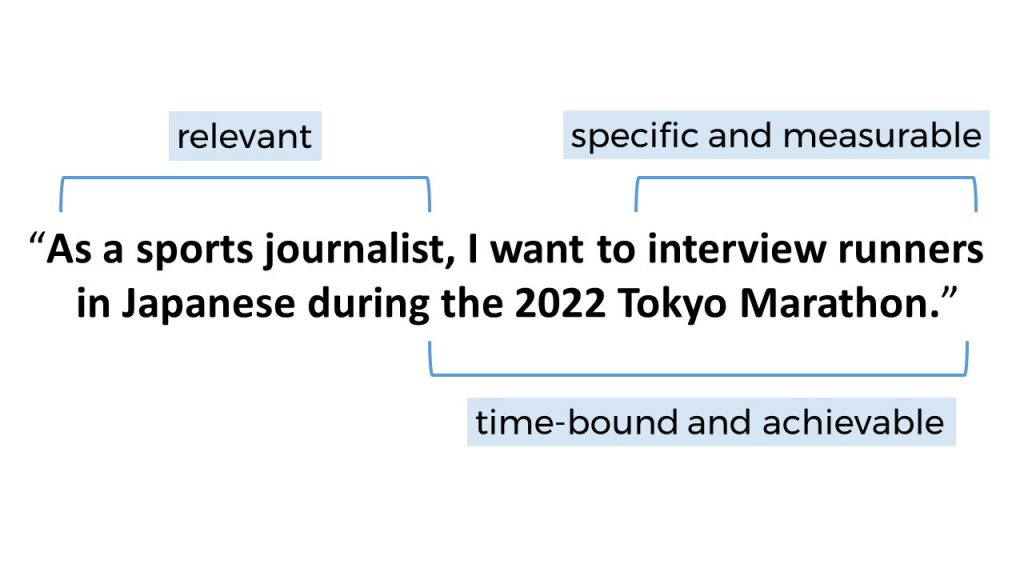When learning Japanese, motivation and excitement is highest when you’re a beginner. It’s easy to chart your progress, and your world noticeably expands with every word, grammar point, and kanji character learned. You beam with pride as you start traveling to Japan, using key phrases and sentence structures to order meals, greet the locals, and navigate your way across the country.
This newfound confidence quickly propels your language learning journey forward, but before you realize what’s happening, you slam into a wall: the infamous intermediate-level plateau. At this stage, your vocabulary, kanji, and grammar knowledge continue to grow, but it’s much harder to actually recognize this. Everything tends to blend together. Sure, you can hold basic conversations and get through some long-form content, but fully comprehending native-level books and films is still a seemingly unachievable fantasy.
It is at this stage that having clearly defined goals becomes more important than ever. This is when it’s time to create SMART goals.
What Are SMART Goals?

Born from the business world, SMART goals are also perfect for personal pursuits such as language learning. First coined by consultant George T. Doran, SMART goals are:
- Specific: What exactly do you want to accomplish? Why do you want to achieve your goal?
- Measurable: How can you measure progress? How will you know when you’ve reached your goal?
- Achievable: Do you have the necessary skills? Is your goal worth the effort required?
- Relevant: Is your goal related to your life plan? Is it aligned with the other goals in your life? Why are you doing this now?
- Time-bound: How long will it take to achieve your goal? Do you have a deadline?
Ask yourself these questions and you can turn a vague wish such as “I want to improve my Japanese” into something much more productive and powerful. Read on to find out how.
Specific
There are a variety of reasons to study Japanese. Think carefully about yours. Perhaps you want to communicate better with loved ones. Maybe you want to get more out of your annual sightseeing trips. Or, like many of us, knowing Japanese is integral to your livelihood. Sort these questions out, and write down your answers. You might find a worksheet like this one to be useful.
Measurable
Once you’ve decided on a specific destination, it’s time to figure out how you’ll know when you have arrived. The simplest form of measurement would be achieving certain scores on exams such as the JLPT. However, depending on your goal, exam scores might not be congruent with what you are trying to achieve. I tend to measure my progress by what I can do with the language. Previous goals included knowing enough Japanese to travel anywhere in the country on my own, participate in meetings, pass job interviews, and write emails. Easy-to-measure milestones such as these made it easy to see whether or not I was making progress with my studies.
Achievable
I can’t count how many times I’ve seen people give up on language learning simply because they failed to set realistic goals. When tackling a new language, learners often fail to realistically account for their station in life. Someone working full-time with a family simply doesn’t have as much time to study as a college student or part-time worker does. Therefore, if you have interests, responsibilities, and priorities that trump Japanese, set your goals accordingly: making a living as an interpreter within five years might not be achievable considering your current circumstances.
Relevant
It’s important to do a gut check to ensure that studying Japanese is the right thing to be doing at this time in your life. Learning a new language requires a massive time commitment, and as gratifying as the process can be, you may have more pressing concerns at this moment. For example, if you are in the process of becoming an accountant, you should probably be focusing your efforts on passing the CPA Exam. You can always come back to learning Japanese later.
Time-bound
As tempting as it may be, we can’t simply toil away at our goals indefinitely. It’s important to make your best estimate of how long it will take to achieve your goal and, when the time is up, evaluate your performance. If you succeeded, it’s time for a brand new SMART goal. If you failed, do a postmortem to figure out what went wrong, pivot to a new approach, and try again. The time-bound aspect of goal setting is closely related to making your goal achievable. Be realistic based on what’s going on in your life.

What’s Your SMART Goal?

Now that you’ve had a brief primer on crafting SMART goals, it’s time to reevaluate your language-learning progress and determine your next steps. What are you going to set out to achieve? Let us know via your favorite social media platform.





